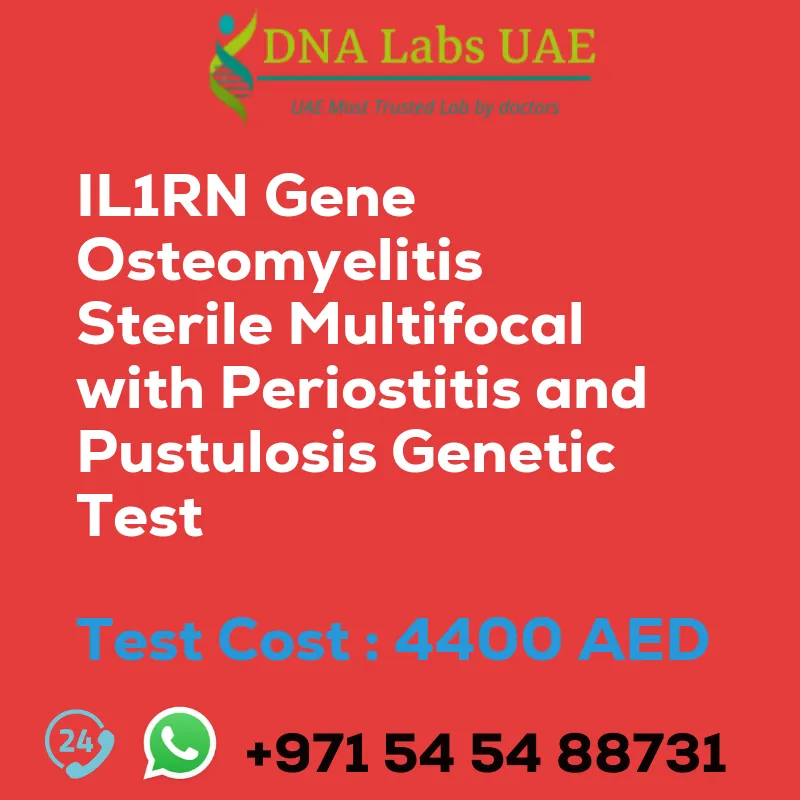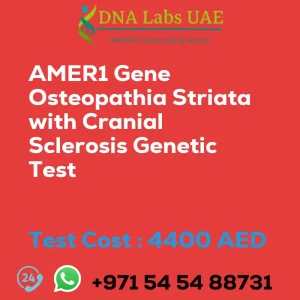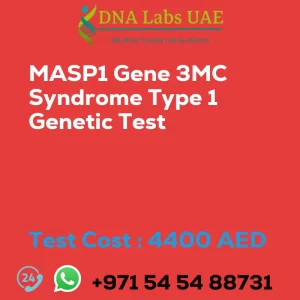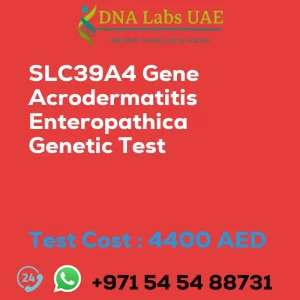IL1RN Gene Osteomyelitis sterile multifocal with periostitis and pustulosis Genetic Test
At DNA Labs UAE, we offer the IL1RN Gene Osteomyelitis sterile multifocal with periostitis and pustulosis Genetic Test for the diagnosis of various osteology, dermatology, and immunology disorders. This test is specifically designed for individuals who are suspected to have IL1RN gene mutations, which can contribute to the development of osteomyelitis, sterile multifocal osteomyelitis, periostitis, and pustulosis.
Test Details
The IL1RN gene is responsible for encoding the interleukin-1 receptor antagonist (IL-1Ra), a crucial protein involved in regulating the inflammatory response. Mutations or variations in the IL1RN gene can disrupt the production or function of IL-1Ra, leading to dysregulation of the inflammatory response and potentially contributing to the development of various inflammatory conditions.
Osteomyelitis is a condition characterized by inflammation and infection of the bone, while sterile multifocal osteomyelitis refers to a type of osteomyelitis that occurs without the presence of a bacterial or fungal infection. Periostitis refers to inflammation of the periosteum, which is the outer layer of the bone, and pustulosis refers to the formation of pustules (pus-filled blisters) on the skin.
NGS (Next-Generation Sequencing) genetic testing is a cutting-edge technique used to analyze multiple genes simultaneously. It allows us to identify genetic variations or mutations that may be associated with a particular condition or disease. In the context of IL1RN gene and osteomyelitis, sterile multifocal with periostitis and pustulosis, NGS genetic testing can help identify any genetic variations or mutations in the IL1RN gene that could contribute to the development of these conditions.
By performing this genetic test, we can provide valuable information for diagnosing the condition, understanding its underlying genetic causes, and potentially guiding treatment decisions.
Test Components and Price
Test Name: IL1RN Gene Osteomyelitis sterile multifocal with periostitis and pustulosis Genetic Test
Price: 4400.0 AED
Sample Condition
Blood or Extracted DNA or One drop Blood on FTA Card
Report Delivery
3 to 4 Weeks
Method
NGS Technology
Test Type
Osteology Dermatology Immunology Disorders
Doctor
Dermatologist
Test Department
Genetics
Pre Test Information
A Genetic Counselling session is recommended before undergoing the IL1RN Gene Osteomyelitis sterile multifocal with periostitis and pustulosis Genetic Test. This session helps draw a pedigree chart of family members affected with IL1RN Gene Osteomyelitis, sterile multifocal with periostitis and pustulosis NGS Genetic DNA Test gene IL1RN.
| Test Name | IL1RN Gene Osteomyelitis sterile multifocal with periostitis and pustulosis Genetic Test |
|---|---|
| Components | |
| Price | 4400.0 AED |
| Sample Condition | Blood or Extracted DNA or One drop Blood on FTA Card |
| Report Delivery | 3 to 4 Weeks |
| Method | NGS Technology |
| Test type | Osteology Dermatology Immunology Disorders |
| Doctor | Dermatologist |
| Test Department: | Genetics |
| Pre Test Information | Clinical History of Patient who is going for IL1RN Gene Osteomyelitis, sterile multifocal, with periostitis and pustulosis NGS Genetic DNA Test. A Genetic Counselling session to draw a pedigree chart of family members affected with IL1RN Gene Osteomyelitis, sterile multifocal, with periostitis and pustulosis NGS Genetic DNA Test gene IL1RN |
| Test Details |
The IL1RN gene is responsible for encoding the interleukin-1 receptor antagonist (IL-1Ra), which is an important protein involved in regulating the inflammatory response. Mutations or variations in the IL1RN gene can affect the production or function of IL-1Ra, leading to dysregulation of the inflammatory response and potentially contributing to the development of various inflammatory conditions. Osteomyelitis is a condition characterized by inflammation and infection of the bone, while sterile multifocal osteomyelitis refers to a type of osteomyelitis that occurs without the presence of a bacterial or fungal infection. Periostitis refers to inflammation of the periosteum, which is the outer layer of the bone, and pustulosis refers to the formation of pustules (pus-filled blisters) on the skin. NGS (Next-Generation Sequencing) genetic testing is a technique used to analyze multiple genes simultaneously to identify genetic variations or mutations that may be associated with a particular condition or disease. In the context of IL1RN gene and osteomyelitis, sterile multifocal with periostitis and pustulosis, NGS genetic testing may be performed to identify any genetic variations or mutations in the IL1RN gene that could contribute to the development of these conditions. This information can be helpful in diagnosing the condition, understanding its underlying genetic causes, and potentially guiding treatment decisions. |








